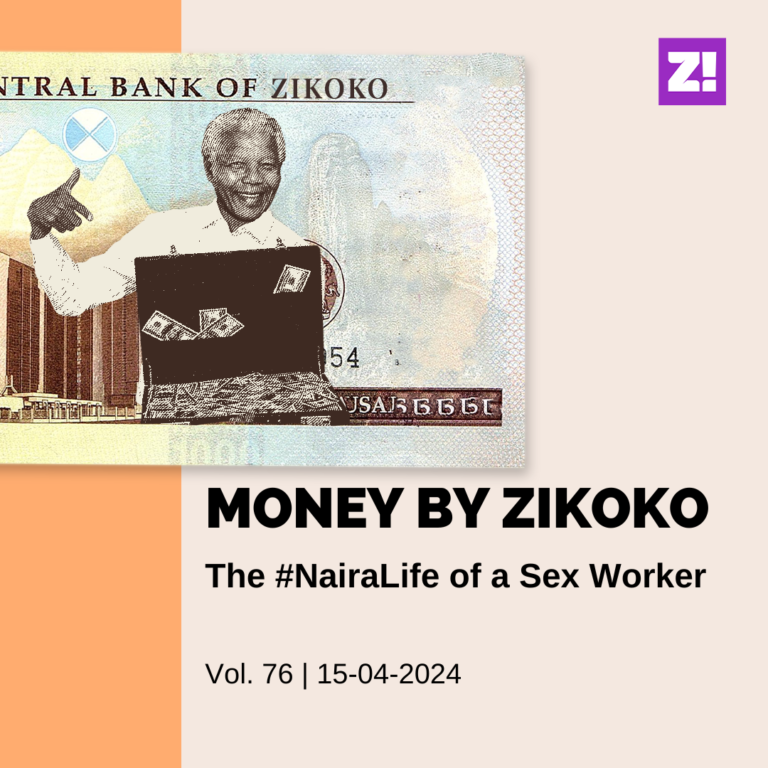As told to Toheeb
It’s scary how a life event can disrupt other seemingly well-laid plans and affect the trajectory of the subsequent years. This was all I was thinking about as this woman narrated her story. There’s something else I can’t get out of my mind. At the beginning of the conversation, I asked her why she wanted to share this story. She said: “I have a couple of things on my mind, and I just want someone to listen.”
And that’s what I did. I listened.
My father’s greatest dream was to see his four daughters get a good education. Back when I was young, he told me that I was going to be a doctor. I don’t know how much he earned as a soldier in the Nigerian Army, but he had a separate savings account for me and my sisters’ school fees. We were one of the first people to pay our fees every term.
He was killed in action in 2011. He was in Maiduguri, fighting Boko Haram. And his dreams died with him. I was only 16.
One of the last things he said to us as he left the house to report for duty was that we pray for his return. We prayed, but it wasn’t enough. I was in the living room watching TV with my mum and my sisters when the phone rang. The person on the other end informed my mother that my father had been among a group of soldiers that was caught in a Boko Haram ambush. They wanted her to identify his body.
He was interred alongside the others who died with him in a mass burial.
He died in active service and was entitled to benefits. This was where things got tricky. My mum wasn’t his next of kin because she was battling some health challenges. His next of kin used to be me and one of my sisters. However, a few months before he passed, he removed my name and included his younger brother, my uncle.
My sister was still a minor when they started processing his benefits. So my uncle, who was the co-signatory, was the next in line to sign before his benefits would be released to us. He took advantage of that. At first, it was about how we couldn’t be entitled to the money because none of us was a boy.
It was more than that, though. My uncle wanted to marry my mother. She refused and that hurt his ego, so he thought he could make life hell for us. After a while, he and the rest of my father’s family agreed to release half of the money to us.
But that wasn’t the only problem we had to deal with.
We were living in the barracks when my father died. After some time, the authorities asked us to move out of the apartment. Why? There were men in active service who needed accommodation. Now this shouldn’t have been a problem because my father had built a house in our village in Benue state. My uncle stood in the way of getting that too. He kicked us out of the house.
I don’t know how much my father’s family gave us, but it wasn’t going to be enough to send all of us to school. My mother used part of the money to build a new house, too, so all of us had to make sacrifices. We agreed that my eldest sister would go to university. The rest of us would find our way.
I started learning hairdressing in 2014. On the side, I also learned how to make soap. Whatever hopes I had of returning to school died when my eldest sister — the one in university — fell sick. What remained of the money my father left was used to nurse her back to health.
There was a little glint of hope for me in 2015. The Nigerian Army was recruiting, and I applied. I was invited to write an exam at one of the barracks in Abuja. I had ₦20k in my savings and my sister supported me with ₦5k. However, this was only enough to get me to Abuja and back. Not anything else.
I arrived in Abuja on the eve of the exam. The best option for me was to sleep at a chapel in the barracks if I hoped to meet up with the exam the following day. Sometime during the evening, the catechist at the church sent me on an errand to buy a drink for him. He called me into the vestry when I returned. I handed the drink to him and made to leave, but he asked me to sit down. I thought he wanted to pray for me or have a short conversation.
Minutes later, he started making advances at me, and I got uncomfortable. As I stood to leave, he blocked the exit and didn’t let me leave until he had his way with me. This man sexually assaulted me. He knew there were people in the church that could catch him, but that didn’t stop him. It didn’t save me.
I wasn’t prepared to let the incident go without a fight. On the morning of my exam, I looked for the Major-General in charge of the church to tell him what had happened to me. I found him but the queue of people who wanted to see him that morning was long. I had an exam to write and was hungry. My heart boiled with rage as I left. I wasn’t going to get any form of justice.
The moment I finished writing my exam, I left the barracks. I couldn’t go back home to Benue immediately, so I went to stay with my sister at her school. I didn’t tell her what happened. I didn’t tell my mum either. I was scared that they would blame me. I still remember the man’s name and haven’t gotten over the fact that he got away with what he did to me.
It was all for nothing, too. The exam results came out a few weeks later, and I didn’t make it to the next stage. There was nothing to show for my trip to Abuja and everything that happened there.
There was also nothing in the village for me, soI left sometime that year and moved to Lagos. One of my people in the village had moved here earlier and she took me in. I stayed with her and looked for work. I found one as an office assistant in a job agency. My salary was ₦15k.
I was at the job for a couple of months. I had to quit because the person I lived with was moving out. Like that, I was homeless. However, I was fortunate to find another friend who agreed to house me. The only problem was that she was married and only agreed to take me in because her husband was away at the time. We both understood that I would leave the moment her husband returned.
I found another job with some vegetable farmers at Ojo. Every morning, a vehicle would come and transport the produce to Oyingbo market. My job was to weed the farm and apply manure. I woke up early every morning to cover as much ground as possible. It was a stressful job, but it brought ₦25k-₦30k every month.
After about eight months of living with my friend and working on the farm, her husband returned and I had to move out agan. Thankfully, I had about ₦200k in savings. It was more than enough to rent a house. I moved into a small room in Oshodi and the rent was ₦37k.
I met the man that would become my husband in 2017, and we fell in love. We got married later that year. Our first child was born in 2018.
It wasn’t my happily ever after — at least not yet. The government had demolished his shop in Oshodi, where he repaired electronic devices in 2016. I couldn’t sit idly by. I wanted to do something, anything to support him while he figured out how to get back on his feet. I went back to the farm at Ojo. I was pregnant with my second child at the time.
2020 ended up being one of the worst years of my life. There were complications during childbirth. The doctor said it was because of all the stress I’d put my body through on the farm. When it became clear that I couldn’t deliver the baby by myself, I was wheeled off to the theatre for the Caesarean section procedure. This alone cost ₦200k. That was money we didn’t have, but we managed to raise it.
The operation didn’t save my baby, and I never got to meet him. He died inside me.
I’m still dealing with the aftermath of that. The event took a toll on our already struggling finances and things haven’t been the same since then. My husband blames me for everything that happened. We argue more than ever these days. The first thing he mentions in an argument is how the operation is affecting his life. It’s almost as though he believes I wanted it to happen. I won’t lie, I’ve thought about leaving the marriage.
The only thing I want right now is figuring out how to restart my hairdressing and soap-making business. My husband had promised to set me up but with everything that’s happened, I don’t know if that’s still going to happen.
On the other hand, he is my husband and he asked me to wait for him to set me up, so I will wait. Sometimes, I just wish I could have it easier.




